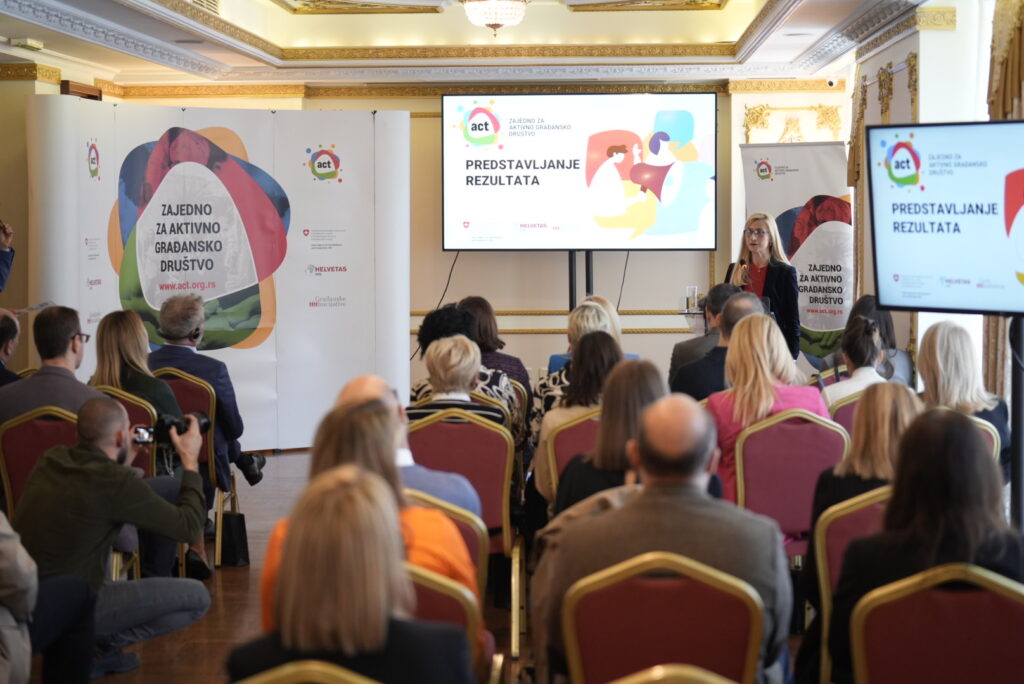Today at the Moskva Hotel, the four-year results of the ACT project (For an Active Civil Society Together) were presented. ACT project was supported by the Swiss Government and implemented by Helvetas Swiss Intercooperation and Civic Initiatives from Belgrade.
Within the framework of the ACT project, in the last 4 years, 184 citizens’ organizations throughout Serbia (70% outside from Belgrade) have been financially supported by the Government of Switzerland in the amount of 3 million euros. The total value of the project is 5.96 million euros. More than 150,000 citizens have directly benefited from the ACT project. During the duration of the project, 34 policy documents were adopted at the local and 11 policy documents at the national level, which directly affect the improvement of citizens’ lives. From November 2023, the ACT project enters the second phase of implementation, a new four-year cycle for which the Swiss Government has allocated more than 6 million euros.
Supported projects cover areas related to human rights, social services, environmental protection, health, development and housing, solving specific problems in local communities. Some of them dealt with the empowerment of women in rural areas, the right of women’s inheritance, the phenomenon of child marriages of the Roma population, the situation of children without parental care, the adoption of the Law on Emergency Aid, the establishment of a platform for social service providers in Novi Pazar, the protection of the rights of Alzheimer’s patients, support for associations with rare diseases and many others.
At the event, which brought together representatives of state institutions, embassies, international and domestic organizations and the media, the following spoke: Mr Richard Kohli, Head of Cooperation, Embassy of Switzerland in Serbia, Ms. Snežana Mišić Mihajlović, Governance Portfolio Manager EE/International Team Leader – ACT/Helvetas Swiss Intercooperation Serbia and Ms. Ksenija Nikic, Capacity building Program Manager, Civic Initiatives.
Mr Richard Kohli, Head of Cooperation, Embassy of Switzerland in Serbia, pointed out that Switzerland, together with other development partners, remains committed to providing support to the strengthening of civil society in Serbia. “When we talk about results, it is not enough to be guided only by the facts and figures that we can see in the reports, the stories of people that best illustrate how their lives have changed for the better are much more important. And in the next phase of ACT, we will continue to support civil society actors throughout Serbia, including informal movements that are quite successful in mobilizing citizens who want to solve specific issues.”
Ms. Snežana Mišić Mihajlović, Team Leader – ACT/Helvetas Swiss Intercooperation Serbia pointed out that ACT’s approach in the first phase was to provide targeted support to the organizational development of citizens’ associations through education and mentoring. “For this purpose, we hired about 50 educators and mentors, experts from various fields. This speaks of our approach in which we wanted education to be based and adapted to the needs of organizations as much as possible. From this perspective, we think there is still a lot of room for this type of support in the next phase,” Snezana concluded.
Ms. Ksenija Nikic, Capacity building Program Manager, Civic Initiatives said that the lessons learned from the previous phase of the ACT program are important for the next phase of ACT, and that the plans for the next phase were based on the experience gained, with the intention that the next phase would be more efficient and even more adapted to the needs of the civil sector in Serbia.






